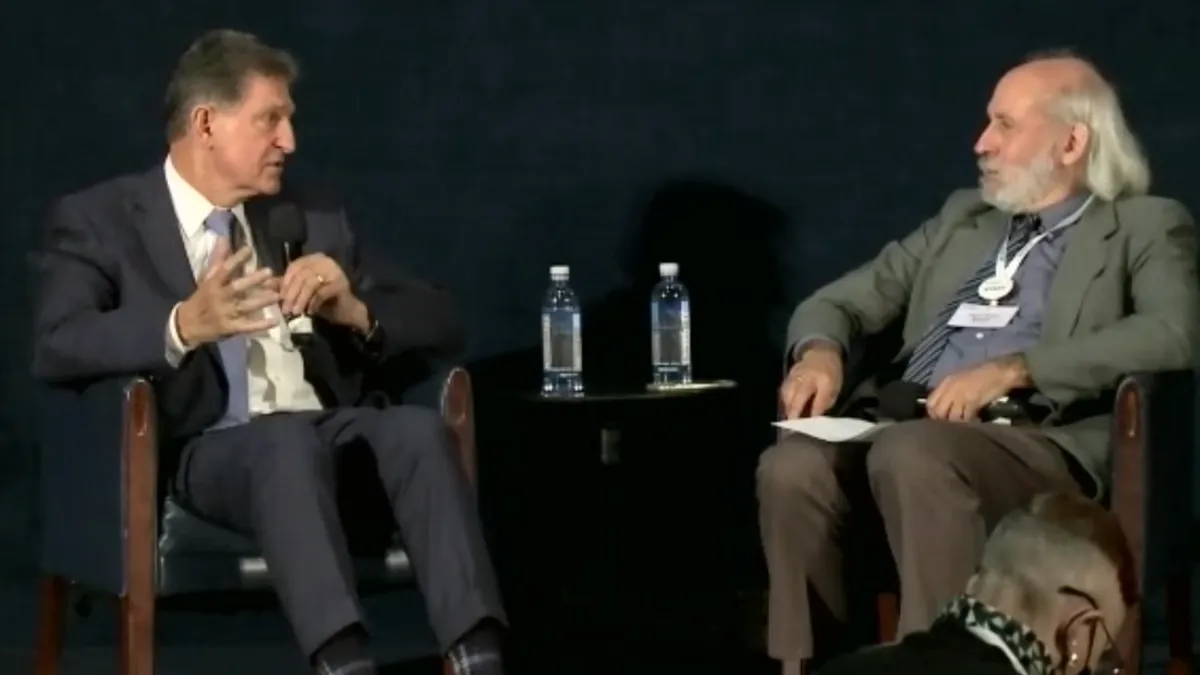Dive Brief:
- Sen. Joe Manchin, D-W.Va., wants the Senate to advance his energy permitting reform proposal as an amendment to the National Defense Authorization Act, or NDAA, and said Thursday that the issue has “become personal.”
- Republicans won’t support the measure because they “are so mad at me because we passed the Inflation Reduction Act,” he said at the American Council for an Energy-Efficient Economy’s policy forum. And progressives oppose Manchin’s Building American Energy Security Act of 2022 because it would advance the long-delayed Mountain Valley natural gas pipeline, among other reasons.
- On transmission siting, Manchin’s proposal would speed the process but allows a one-year backstop for states to consider projects before the Federal Energy Regulatory Commission can issue a construction permit if it finds the project in the national interest. Some clean energy experts say the reform proposal is not perfect but fear Congress’ lame duck session is their best chance before Republicans retake the House next year.
Dive Insight:
Speakers at ACEEE’s policy forum agreed the Inflation Reduction Act has created a historic opportunity for clean energy development. But without transmission reform there will be “billions and billions of dollars stranded,” Manchin warned.
Asked about the chances to advance permitting reform in the lame-duck session of Congress, Manchin replied, “I don't know where it's going. I don't know if it's gonna go. I mean, we're trying everything humanly possible.”
Among conservatives, Manchin said the bill is being blocked because of his support for the Inflation Reduction Act, which provided $369 billion in clean energy incentives. Progressives call his permitting comprises a “dirty deal,” he acknowledged.
Manchin’s permitting reform proposal was left out of the NDAA language passed by the House. The senator on Wednesday called for the Senate to amend the bill to include his reforms.
A summary of Manchin’s proposal said it would “tighten up cost allocation language” to address concerns about how transmission projects are considered by FERC, and it would allow the federal regulatory agency to offer more competitive salaries for permitting roles.
The bill also clarifies that if a state issues a permit within a year, “the state won’t be overruled if FERC uses its backstop authority for the project because other states have not issued permits.”
“As Senator Manchin makes changes to his dirty permitting deal in an effort to secure Republican votes, the bill has only gotten worse,” Earthjustice President Abigail Dillen said in a statement.
Other clean energy experts are taking a softer stance.
“I think it's a big mistake for progressives and environmental justice advocates to kill a permitting reform deal in the current lame duck session of Congress,” tweeted Dana Nuccitelli, research coordinator for Citizens’ Climate Lobby.
"The concern is that Manchin's deal also makes it easier to build fossil fuel infrastructure. A little bit, but they already have the advantage. ... Permitting reform would level that playing field,” Nuccitelli continued. With Republicans set to retake the House in 2023 “opposing the current deal is counter-productive because any future deal will only add more provisions that justice advocates dislike.”
“There is a real cost to front-line communities if we fail to expand clean energy fast enough to meet electrification needs AND drive coal & gas out,” Jesse Jenkins, an assistant professor at Princeton University, wrote in a tweet. “Much of this permitting reform debate has been presented as black & white, but we're living in the grey now.”
Jenkins added, however, that Manchin’s revised language “falls short of full FERC authority for national interest transmission lines. That's bad.”














